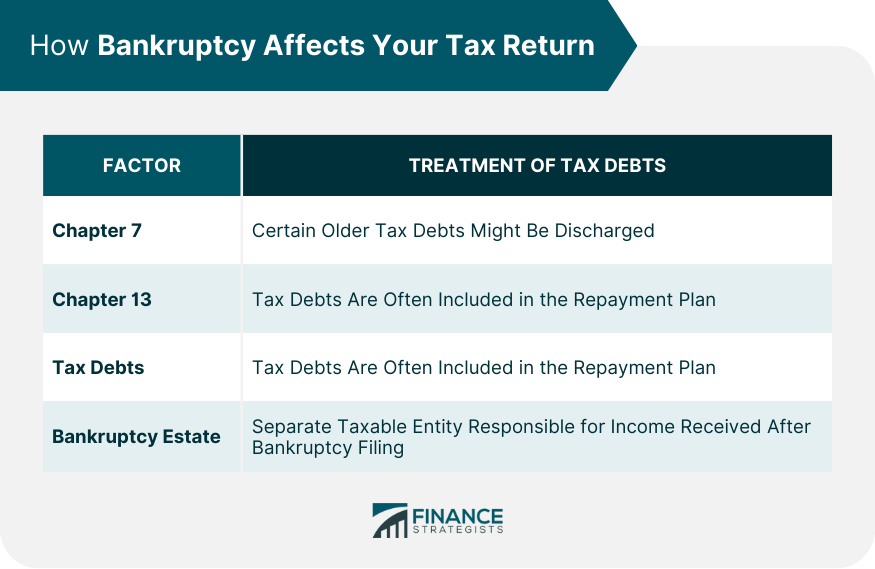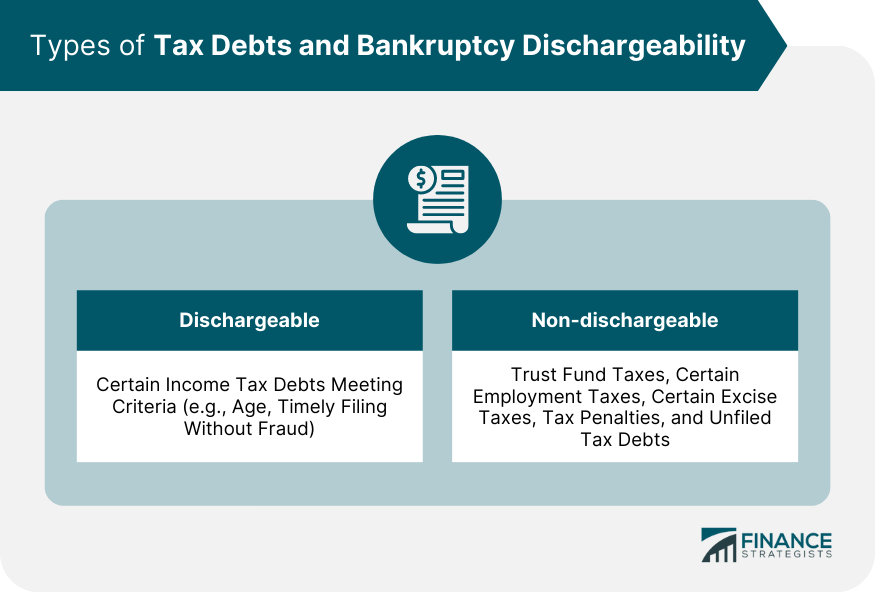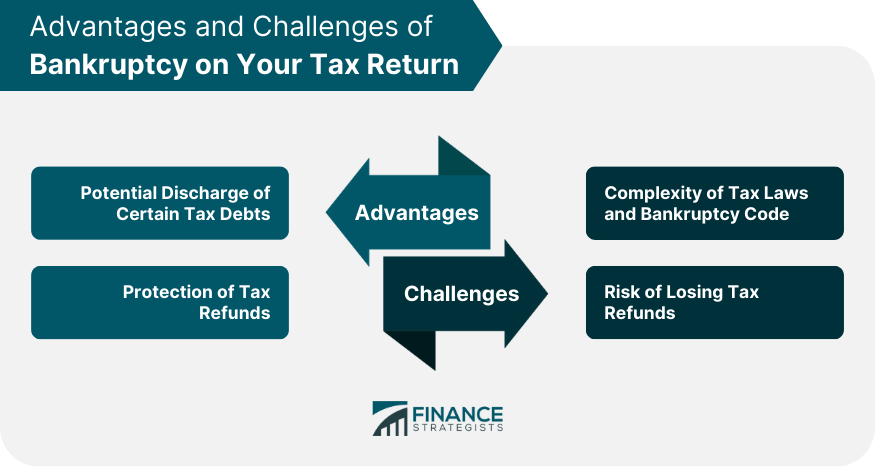Yes, filing for bankruptcy can indeed affect your tax return. When a bankruptcy case is filed, a separate taxable entity known as a bankruptcy estate is created, which could have implications for your tax situation. The type of bankruptcy filed, Chapter 7 or Chapter 13, also significantly impacts your tax return. In Chapter 7 bankruptcy, you may discharge certain types of tax debts, while Chapter 13 bankruptcy often includes tax debts in a repayment plan. Furthermore, tax refunds can become part of the bankruptcy estate and may be used to repay creditors. However, it's crucial to note that not all tax debts can be discharged in bankruptcy, and the specific impact on your tax return can vary greatly based on your individual circumstances. Therefore, it's advised to seek professional legal and tax advice when navigating bankruptcy. The influence of bankruptcy on your tax return can be shaped by the type of bankruptcy chapter filed. Chapter 7 bankruptcy, also known as "liquidation bankruptcy," and Chapter 13 bankruptcy, often referred to as "reorganization bankruptcy," handle tax debts differently. In a Chapter 7 bankruptcy, certain types of older tax debts might be discharged, while in Chapter 13 bankruptcy, tax debts are often included in the repayment plan, which allows the debtor to pay them over a period of time. Tax debts, like other financial obligations, are addressed in bankruptcy. Depending on the nature and timing of the tax debt, some may be discharged during bankruptcy. For instance, income tax debts may be eliminated if they are for taxes that were due three years before filing for bankruptcy, the tax return was filed at least two years prior, and the tax assessment is at least 240 days old. When an individual files for bankruptcy, a separate taxable entity, known as a bankruptcy estate, is created. This entity is responsible for paying taxes on income it receives after the bankruptcy filing. For example, if you rent out property after filing for bankruptcy, the rental income would typically be reported by the bankruptcy estate, not on your individual tax return. Not all tax debts can be discharged in bankruptcy. Typically, only certain income tax debts are dischargeable. This usually includes federal income tax debts that meet specific criteria, such as being at least three years old and based on a tax return that was filed on time and without fraud. Certain tax debts are typically non-dischargeable, meaning they cannot be eliminated in bankruptcy. This generally includes taxes such as trust fund taxes (taxes withheld from an employee's wages by an employer), certain employment taxes, and certain excise taxes. Furthermore, tax penalties associated with non-dischargeable taxes and tax debts from unfiled tax returns are usually not discharged. One significant advantage of filing for bankruptcy is the potential to discharge certain tax debts, as discussed above. This could potentially alleviate a significant financial burden for individuals struggling with overwhelming tax obligations. In some cases, bankruptcy may also protect future tax refunds. This is particularly relevant in Chapter 13 bankruptcy, where ongoing tax refunds may be considered part of the bankruptcy estate and can be used to repay creditors under the repayment plan. However, with careful planning and legal advice, it may be possible to protect some or all of these refunds. The intersection of tax laws and the bankruptcy code is a complex area that can create challenges for individuals filing for bankruptcy. Making sense of these laws and regulations requires a solid understanding of both tax law and bankruptcy law, and missteps can lead to significant consequences, including potential tax penalties and missed opportunities for discharge. There is also a risk of losing tax refunds in bankruptcy. In a Chapter 7 bankruptcy, any tax refund that you are entitled to at the time of filing becomes part of the bankruptcy estate and can be used to pay your creditors. In a Chapter 13 bankruptcy, tax refunds received during the repayment plan period can also be taken into the bankruptcy estate. Before filing for bankruptcy, it's important to fully understand the nature of your tax debt. As not all tax debts can be discharged in bankruptcy, understanding which debts you have can help inform your decision. Also, the chapter of bankruptcy you choose to file will impact how your tax debts are treated. As such, it's important to evaluate which chapter is most appropriate for your circumstances. Given the complexity of bankruptcy and tax laws, consulting with a bankruptcy attorney or tax professional is often advisable. These professionals can provide guidance tailored to your situation and help you navigate the intricacies of bankruptcy and tax obligations. After filing for bankruptcy, it's important to stay current with your tax return filings. Filing your tax returns on time each year can help avoid new tax debts and penalties that cannot be discharged in bankruptcy. Post-filing, you should also monitor any significant changes in your income or debts, as these could potentially affect your tax situation or bankruptcy case. Lastly, regularly reviewing the status of your bankruptcy estate can help ensure you're accurately reporting income and assets to the bankruptcy court and the IRS, helping avoid potential complications. Bankruptcy has a significant impact on your tax return, mainly through the creation of a separate taxable entity, the bankruptcy estate. The type of bankruptcy - Chapter 7 or Chapter 13 - determines how tax debts are handled. Some older tax debts may be discharged in Chapter 7, while Chapter 13 typically includes them in a repayment plan. However, it's crucial to note that not all tax debts can be discharged. The complexity of bankruptcy and tax laws presents challenges, and individuals risk losing their tax refunds in bankruptcy. Therefore, understanding the nature of your tax debt, evaluating which bankruptcy chapter to file, and seeking professional consultation is essential. Post-filing, staying current with tax returns, monitoring changes in income or debts, and regular reviews of the bankruptcy estate status are crucial. Ultimately, handling bankruptcy and taxes is a complex matter requiring careful planning and advice.Does Bankruptcy Affect Your Tax Return?
How Bankruptcy Affects Your Tax Return
Impact of Different Bankruptcy Chapters
Effect on Tax Debts
Role of the Bankruptcy Estate

Types of Tax Debts and Bankruptcy Dischargeability
Dischargeable Tax Debts
Non-dischargeable Tax Debts

Advantages of Bankruptcy on Your Tax Return
Potential Discharge of Certain Tax Debts
Protection of Tax Refunds
Challenges and Risks of Bankruptcy on Your Tax Return
Complexity of Tax Laws and Bankruptcy Code
Risk of Losing Tax Refunds

Precautions When Considering Bankruptcy Impact on Tax Returns
Understand the Nature of Your Tax Debt
Evaluate Which Bankruptcy Chapter to File
Avail Professional Consultation
Practical Steps Post-bankruptcy Filing
Stay Current With Tax Returns
Monitor Changes in Income and Debts
Regular Review of the Bankruptcy Estate Status
Bottom Line
Does a Bankruptcy Affect Your Tax Return? FAQs
The impact of bankruptcy on your tax return can vary greatly based on the type of bankruptcy filed and the nature of your tax debts. It can potentially lead to the discharge of certain tax debts, changes in tax deductions, and the creation of a separate taxable entity known as a bankruptcy estate.
No, not all types of tax debts are dischargeable in bankruptcy. Generally, only certain income tax debts can be discharged, including federal income taxes due three years before filing for bankruptcy, provided the tax return was filed on time and without fraud. Some tax debts, such as certain employment taxes and taxes from unfiled returns, are typically not dischargeable.
The type of bankruptcy you file can significantly affect your tax return. In Chapter 7 bankruptcy, certain types of tax debts may be discharged entirely. In contrast, Chapter 13 bankruptcy typically includes tax debts in a repayment plan, allowing you to pay them over a period of time.
Yes, there is a risk of losing your tax refund in bankruptcy. In Chapter 7 bankruptcy, any tax refund you're entitled to at the time of filing becomes part of the bankruptcy estate and can be used to repay creditors. In Chapter 13 bankruptcy, tax refunds received during the repayment plan period may also become part of the bankruptcy estate.
After filing for bankruptcy, it's essential to stay current with your tax return filings and monitor any significant changes in your income or debts. Regularly reviewing the status of your bankruptcy estate can also help ensure you're accurately reporting income and assets to the bankruptcy court and the IRS. Consulting a professional for advice tailored to your situation is also advisable.
True Tamplin is a published author, public speaker, CEO of UpDigital, and founder of Finance Strategists.
True is a Certified Educator in Personal Finance (CEPF®), author of The Handy Financial Ratios Guide, a member of the Society for Advancing Business Editing and Writing, contributes to his financial education site, Finance Strategists, and has spoken to various financial communities such as the CFA Institute, as well as university students like his Alma mater, Biola University, where he received a bachelor of science in business and data analytics.
To learn more about True, visit his personal website or view his author profiles on Amazon, Nasdaq and Forbes.











